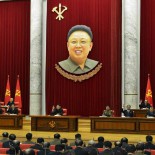Is there a strategic partnership between China, Iran and the DPRK
World Tribune reports on a new study conducted by Jane’s Group’s Dr. Christina Lin for the Israel-based GLORIA Center that follows recent interactions and exchanges between China, Iran and the DPRK. Dr. Lin contends that recent weapons transactions between these three countries is forming the basis for a strategic alliance.
You can download the full study here.
The report said North Korea helped develop Iran’s Shihab ballistic missiles series. Author Christina Lin said North Korea’s Taepo Dong intermediate-range missiles have served as the basis of Iran’s program, including the design of a nuclear interncontinental ballistic missile with a range of up to 6,000 kilometers, dubbed Shihab-6.
China has sought to make Iran a key waystation in Beijing’s silk road policy of expanding influence throughout Asia. The report said Beijing, believed to be channeling aid through neighboring North Korea, regarded Iran as an ally to balance the strategic relationship between the United States and the Gulf Cooperation Council.
“Iran may also be a new pearl in China’s maritime pearl necklace,” the report said. “China is increasing its naval presence in the Arabian Sea and Indian Ocean, with a call in December 2009 by Chinese Rear Adm. Yin Zhou to set up a permanent naval base in the Gulf of Aden.”
The report did not discount the prospect that China would establish a permanent naval base in Iran. Ms. Yin, today a researcher with Jane’s Chemical, Biological, Radiological and Nuclear Intelligence Center, said China could be offered a naval base at one of Iran’s islands in the Gulf.
“Iran may be inclined to offset U.S. pressure by playing the ‘China card’ should the United States try to project military power by utilizing some of the UAE’s man-made islands,” the report said. “Indeed, in November 2009, NATO entered into the advanced stages of negotiating a Status of Forces Agreement with the United Arab Emirates in the face of Iran’s nuclear threat.”
The report said China was expected to block United Nations Security Council sanctions against Iran. Ms. Lin compared China’s role to that of Russia’s alliance with Serbia when it came under attack by a Western-led coalition in 1999.
Regardless of UN sanctions, North Korea would continue to funnel weapons and technology to Iran, the report said. Ms. Lin said Iran has financed North Korean research and development of ballistic missiles and other strategic systems.
From the study itself:
Similar to China, the Democratic People’s Republic of Korea (DPRK) and Iran have also shared strategic cooperation for more than three decades. Yet scholars in the international security literature continue to treat them as separate variables, with the bifurcation of regional studies between Middle East and East Asian studies. This strategic cooperation has entailed the proxy development of missile and nuclear technologies to sidestep sanctions, collaborative efforts to share test data and weapons designs, and the implementation of a strategy of exploiting the Six Powers Talk (and Six Party Talks) in breaking international commitments to achieve a nuclear fait accompli. An article appeared in 1997 in The Middle East Review of International Affairs, wherein the author warned that DPRK was perhaps the most important single leak in international anti-proliferation effort, playing a destabilizing role in the Middle East. Since radical Middle East regimes face arms embargoes from Western sources of military technology, and China and Russia can only supply up to a point due to international pressures, DPRK fills in the gap as an isolated regime that is by and large impervious to international pressure.
